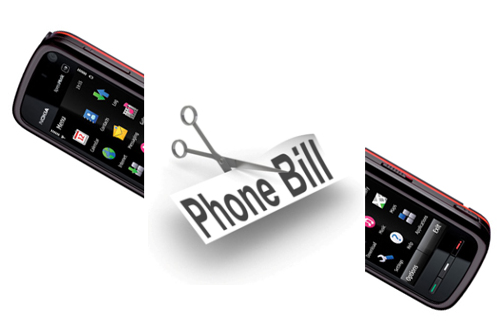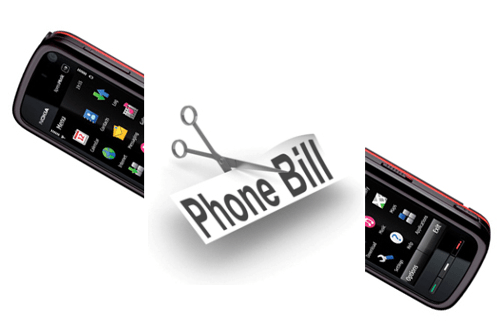While phone carriers continue to compete with one another to provide “the lowest rates,” there are other modes of service available that utilize much greater cost efficiency. Enter Mobile VoIP.
Currently, there are a ton of Mobile VoIP services and applications available. Many of these have already begun to reshape usage.
Typically, these apps/services utilize an Internet connection to enable users to send calls, text, video, and picture messages as digital signals to other users all over the world. In doing so, the service is able to provide users a number of ways to save on their monthly mobile bill.
Free (Local) Calls:
Mobile VoIP works by sending voice calls as digital signals over the Internet. In doing so, users don’t have to go through a carrier to make calls. Instead, they can option a mobile VoIP solution/app over a calling plan. This not only cuts the cost of one’s monthly bill (if not entirely eliminate it), but it also free users from the limitations of calling plans—i.e. metered minutes, night/weekend minutes, rollover minutes, roaming charges, overage charges, incoming call charges, etc. For example, the Viber mobile app allows for free calling, as well as text, video, and photo messaging worldwide using Wi-Fi or 3G connection.
It’s important to note that each mobile VoIP app/service will ultimately have its own way of working—i.e. its own requirements. Generally speaking, however, in using mobile VoIP, users will need to be sure of three things: 1) that their mobile phone is congruous to the service selected, 2) they have downloaded and installed the appropriate software (softphone), and 3) that the parties they are calling are using the same service.
Free/Cheap International Calling & Reduced Roaming:
While a lot of mobile VoIP services allot for free calling, a signifier of a great app is its inclusion of free (or incredibly) cheap International calling. Mobile VoIP is able to reduce International/long distance calling costs as well as roaming charges. Mobile VoIP utilizes an Internet connection to send voice calls as digital signals. As such, calls, both local and International, are made much cheaper (and even free) as no provider is needed to handle the call. The call simply travels over the Internet connection—i.e. over IP. As a result, mobile VoIP is able to offer users increased flexibility, fewer restrictions, and lower (if any) International rates. Additionally, this principle even reduces roaming rate, too. Roaming refers to use of a mobile device outside of the “home” location it was registered in. Again, by working over IP, this cost is slashes considerably.
Alternative Connections:
Though mobile VoIP can improve cost efficiency via free/lower rated local and International call, it can inadvertently drive data costs up. As such, users shouldn’t rely on one mode of Internet connectivity. As stated above, mobile VoIP works by using an Internet connection to transmit data. Depending on your mobile carrier, your data may be limited; therefore, users need to budget their data usage to avoid overages and additional charges. Luckily, users can elect to use alternative connective modes like Wi-Fi and Wi-Fi hotspots. In utilizing Wi-Fi networks, users don’t rely on their carriers’ network; therefore, connection is free and they can better budget their usage of their data plan. Outside of cost, it’s important to consider Wi-Fi as not all carriers support VoIP traffic. In such instances, one will need Wi-Fi to make calls.
Alternative Communications:
Outside of calling, many mobile VoIP apps/services include text, video, and picture messaging services. In addition to this, some even offer free chat services. With these chat services, users can send free messages and multimedia (photos, videos, voice notes, etc.) to an unlimited amount of participants. This can help users trim the use of their text service substantially. Additionally, many carriers charge for multimedia messaging. Chat offers users a way to share the same content without having to pay. A good example of this can be see with Kakao Talk—a free mobile app that includes free text and talk, free chat, group chats, Internet connection options (3G/Edge or Wi-Fi), and more.
Flexibility
Mobile VoIP plans are much more customizable, scalable, and adaptable than phone carriers’ plans. As most of the amenities are free, users don’t have to worry about adhering to the rigid confines of minutes, texts, and various other add-ons (i.e. multimedia messaging, caller ID service, etc.). Depending on which mobile VoIP app/service is selected, and how it’s used, Mobile VoIP can most definitely work to replace carrier plans altogether.
Mobile VoIP presents a number of undeniable cost efficient benefits; however, it does require users to pay closer attention to their usage habits. Ultimately, mobile VoIP can lower and maybe even eliminate your monthly mobile bill altogether. It depends on how users choose to utilize the service. While there are some dangers present, the pros definitely outweigh the cons.




